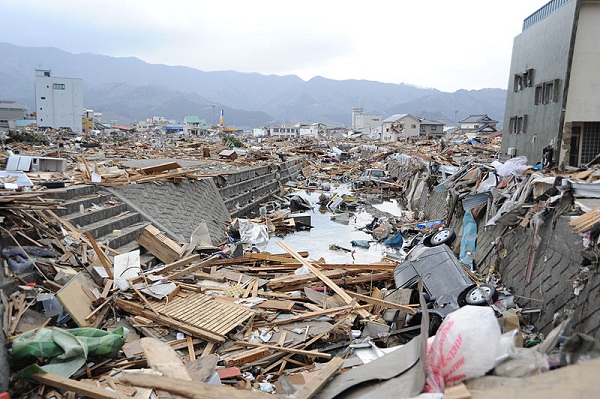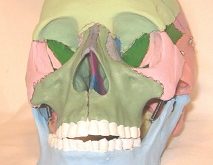Noun: detritus
Pronunciation: (di’trI-tus)
Detritus meaning:
- The remains of something that has been destroyed or broken up

Synonyms: debris, dust, junk, rubble
- Loose material (stone fragments and silt etc) that is worn away from rocks
Quotations:
- Neil deGrasse Tyson- So you’re made of detritus from exploded stars. Get over it. Or better yet, celebrate it. After all, what nobler thought can one cherish than that the universe lives within us all.
- Angela Y. Davis – The prison has become a black hole into which the detritus of contemporary capitalism is deposited. Mass imprisonment generates profits as it devours social wealth, and thus it tends to reproduce the very conditions that lead people to prison. There are thus real and often quite complicated connections between the deindustrialization of the economy a process that reached its peak during the 1980s and the rise of mass imprisonment, which also began to spiral during the Reagan-Bush era. However, the demand for more prisons was represented to the public in simplistic terms. More prisons were needed because there was more crime. Yet many scholars have demonstrated that by the time the prison construction boom began, official crime statistics were already falling.
- Neil deGrasse Tyson – Yes, not only humans but also every other organism in the cosmos, as well as the planets or moons on which they thrive, would not exist but for the wreckage of spent stars. So you’re made of detritus. Get over it. Or better yet, celebrate it. After all, what nobler thought can one cherish than that the universe lives within us all.
- Le Corbusier – Our world, like a charnel-house, is strewn with the detritus of dead epochs.
- Anaïs Nin – The physical as a symbol of the spiritual world. The people who keep old rags, old useless objects, who hoard, accumulate: are they also keepers and hoarders of old ideas, useless information, lovers of the past only, even in its form of detritus? I have the opposite obsession. In order to change skins, evolve into new cycles, I feel one has to learn to discard. If one changes internally, one should not continue to live with the same objects. They reflect one’s mind and psyche of yesterday. I throw away what has no dynamic, living use. I keep nothing to remind me of the passage of time, deterioration, loss, shriveling.
- Jaron Lanier – Zombies are familiar characters in philosophical thought experiments. They are like people in every way except they have no internal experience. If there are enough zombies recruited into our world, I worry about the potential for a self-fulfilling prophecy. Maybe if people pretend they are not conscious or do not have free will or that the cloud of online people is a person; if they pretend there is nothing special about the perspective of the individual – then perhaps we have the power to make it so. We might be able to collectively achieve anti magic. Humans are free. We can commit suicide for the benefit of a Singularity. We can engineer our genes to better support an imaginary hive mind. We can make culture and journalism into second-rate activities and spend centuries remixing the detritus of the 1960s and other eras from before individual creativity went out of fashion. Or we can believe in ourselves. By chance, it might turn out we are real.
- Brent Weeks – It was like a child addressing a tidal wave, saying, I will not be moved and before the words are out of his mouth, all is ocean, leaving no sign; not only no sign of the child, but no sign of his defiance, no sign that anything opposed the crushing sea in the least, no eddy, no swirl, no detritus, only simple, plain, indisputable nothingness.
- P.D. James – It had always been a part of his job which he found difficult, the total lack of privacy for the victim. Murder stripped away more than life itself. The body was parceled, labelled, dissected; address books, diaries, confidential letters, every part of the victim’s life was sought out and scrutinized. Alien hands moved among the clothes, picked up and examined the small possessions, recorded and labelled for public view the sad detritus of sometimes pathetic lives.
- G. Norman Lippert – By the time James had dressed and made his way down to the Great Hal for breakfast, it was nearly ten o’clock. Less than a dozen students could be seen moving disconsolately among the detritus of the morning’s earlier rush. At the far corner of the Slytherin table, Zane sat hunched and squinting under a beam of sunlight. Across from him was Ralph, who saw James enter and waved him over. As James made his way across the Hal , four or five house-elves, each wearing large linen napkins with the Hogwarts crest embroidered on them, circled the tables, meandering in what at first appeared to be random paths. Occasional y, one of them would duck beneath the surface of a table and then reappear a moment later, tossing a stray fork or half a biscuit casual y onto the mess of the table. As James passed one of the elves, it straightened, raised its spindly arms, and then brought them swiftly down. The contents on the table in front of him swirled together as if caught in a miniature cyclone. With a great clattering of dishes and silverware, the corners of the tablecloth shot upwards and twisted around the pile of breakfast debris, creating a huge clanking bag floating improbably over the polished wood table. The house-elf leaped from floor to bench to tabletop, and then jumped, turning in midair and landing lightly on top of the bag. It grasped the twisted top of the bag, using the knot as if it were a set of reins, and turned the bag, driving it bobbingly towards the gigantic service doors in the side of the hall . James ducked as the bag swooped over his head.
- Arnold Weinstein – We are stripped of all that gave value and substance to our existence: power and love; in this naked final state, our last lover, our mate, death, comes. Bereft, without cover, we face the elements that will undo us. The winter breakers crash over and through us, flaunting their vigor and our nullity, as if the entire cosmos were now taking its ultimate revenge on the human creature who has lived too long: the dying sun mocks us from the west, for it will return tomorrow to die again, but we go down only once; the rising sun mocks us from the east, for we will not share in the rebirth of light and life; the noonday taunts us with its heat and vitality, for we are detritus; the north finally cloaks us in our last vestments: eternal night. That is how it ends.
Sample sentences:
- Everyone is supposed to be a combination of nature and nurture, their true selves shaped by years of friends and fights and parents and dreams and things you did too young and things you overheard that you shouldn’t have and secrets you kept or couldn’t and regrets and victories and quiet prides, all the packed-together detritus that becomes what you call your life.
- I was in a fast-food restaurant for the first time in my adult life, an enormous and garish place just around the corner from the music venue. It was mystifyingly, inexplicably busy. I wondered why humans would willingly queue at a counter to request processed food, then carry it to a table which was not even set, and then eat it from the paper? Afterward, despite having paid for it, the customer themselves are responsible for clearing away the detritus. Very strange.
- She was not busy dying, and there is no detritus of care, she was simply busy living, and then she was gone.
- Time is like a river flowing endlessly through the universe. And if you poled your flatboat in that river you might fight your way against the current and travel upstream into the past. Or go with the flow and rush into the future. This was in a less cynical time before toxic waste dumping and pollution filled the waterway of Chronus with the detritus of empty hours wasted minutes years of repetition and time that has been killed.
- Got to love a dude that says things like kinetic and detritus.
- The difference lies in the fact that in Istanbul the remains of a glorious past civilization are everywhere visible. No matter how ill-kept, no matter how neglected or hemmed in they are by concrete monstrosities, the great mosques and other monuments of the city, as well as the lesser detritus of empire in every side street and corner, the little arches, fountains, and neighborhood mosques inflict heartache on all who live among them.
- Time, like a skillful tailor, had seamlessly stitched together the two fabrics that sheathed Peri’s life: what people thought of her and what she thought of herself. The impression she left on others and her self-perception had been sewn into a whole so consummate that she could no longer tell how much of each day was defined by what was wished upon her and how much of it was what she really wanted. She often felt the urge to grab a bucketful of soapy water and scrub the streets, the public squares, the government, the parliament, the bureaucracy, and, while she was at it, wash out a few mouths too. There was so much filth to clean up; so many broken pieces to fix; so many errors to correct. Every morning when she left her house she let out a quiet sigh, as if in one breath she could will away the detritus of the previous day. While Peri questioned the world without fail, and was not one to keep silent in the face of injustice, she had resolved some years ago to be content with what she had. It would therefore come as a surprise when, on a middling kind of day, at the age of thirty-five, established and respected, she found herself staring at the void in her soul.
- It is a testament to the unsettling beauty of the genome that it can make the real world “stick”. Our genes do not keep spitting out stereotypical responses to idiosyncratic environments: if they did, we too would devolve into windup automatons. Hindu philosophers have long described the experience of being as a web. Genes form the threads of the web; the detritus that sticks is what transforms every individual web into a being. There is an exquisite precision in that mad scheme. Genes must carry out programmed responses to environments – otherwise, there would be no conserved form. But they must also leave exactly enough room for the vagaries of chance to stick. We call this intersection fate. We call our responses to it choice. An upright organism with opposable thumbs is thus built from a script, but built to go off script. We call one such unique variant of one such organism a self.
- Essex was just a shadow in the room, the shadow of a thing I wanted, which was itself a shadow of wanting. But it was unspeakably sweet to feel even that, and terrifying to know how quickly it would pass. A moment inscribed on water, a memory that would fade to grey. I was nothing but a ghost hunter, chasing the wraith of the man I used to be. A beachcomber of my own detritus.
- We have a natural tendency to romanticize breakthrough innovations, imagining momentous ideas transcending their surroundings, a gifted mind somehow seeing over the detritus of old ideas and ossified tradition. But ideas are works of bricolage; they’re built out of that detritus.
- We can’t leave this world without leaving a lot of detritus behind. We never go out as cleanly as we come in; and even when we come in, there’s the afterbirth.
- The language of distinction ceases to be available; is no longer available. We must search CD Rom for meanings which once were clear, but now are obscure. The words are too big for the narrow column of the contemporary newspaper. We are all one-syllable people now, two at most. So we mumble and stumble into our futures. But it is still our task and our reward to scavenge through the universe picking up the detritus of lost concepts, dusting them down, making them shine. Latin was the best polishing cloth of all, but we threw it away.
- In the end, what I love most about contemporary yoga is its ability to synthesize the everyday with the extraordinary, the practical with the visionary, the mundane with the sacred. I love that yoga can work to release my tense muscles, negative emotions, and psychic detritus at the same time. That it can connect me to my body in ways that create new neural pathways in my brain. That it offers a practical tool for coping with everyday stress, as well as an intuitive opening to the hidden magic of everyday life.
- There is mud everywhere, slicking the asphalt and piling up in corners along with the detritus of daily life: pop cans, cigarette butts, used condoms and bullet shells.
- She hoped he would manage to avoid standing on anything. His bare feet were already filthy but the streets of the Cross held the worst bits of human detritus. Tina didn’t want to have to deal with a piece of glass in Lockie’s foot, or worse. He was walking on tiptoe and more than one adult stopped to look at them. Tina moved quickly, getting Lockie out of sight before the questions had time to form. People tended to ask a lot more questions in the daytime. They saw things more clearly. Tina preferred the dark, where it was easy to hide.She had no idea what she was going to do with the kid after the new clothes and a shower. Maybe if he was warm and fed he would agree to walk into the police station and tell his story. Maybe he just needed a little time. He looked like a thinker. It was possible that she was really fucking up by keeping him. She had no idea what his body had been through. He could drop dead right now or have some kind of psycho meltdown.He looked at the ground as he walked. He held her hand and she guided him around the obstacles. He would not look up.He was locked up inside himself. His body was doing what it needed to do and maybe somewhere in his mind he was trying to find a key. If she got him to go to the police they would bring in a counsellor. Someone with a box of dolls and a soft voice. She had seen a movie about it. Lockie would be able to point to the doll and tell everyone exactly how his childhood had been taken. But would that help? Tina hoped he would be ready to talk to the police soon. If he wasn’t she was really screwed.
- The detritus of left-over life that makes magic what it is, for life is magic, magic is life, the left-over life we don’t even notice we’re living;
- Just so you know, I had already decided I was adopting you and taking you home to meet the rest of the family. I really, really hope you wanted siblings, because you now have two sisters, a brother, a sister-in-law, a brother-in-law, and assorted cousins, aunts, uncles, and other such familial detritus. James looked back to me, blinking in slow bewilderment. Ah, he said finally. I suppose I’ll have a busy Christmas.
- I am not against playfully imagining possible decivilized worlds. But for such imaginings to be truly playful and to have experimental potential, they cannot be models worked out from abstracted conceptions of either past or future societies. In fact, in my opinion, it is best to leave the concept of society itself behind, and rather think in terms of perpetually changing, interweaving relationships between unique, desiring individuals. That said, we can only play and experiment now, where our desire for the apparently impossible meets the reality that surrounds us. If civilization were to be dismantled in our lifetime, we would not confront a world of lush forests and plains and healthy deserts teeming with an abundance of wildlife. We would instead confront a world full of the detritus of civilization abandoned buildings, tools, scrap, etc., etc. Imaginations that are not chained either to realism or to a primitivist moral ideology could find many ways to use, explore and play with all of this, the possibilities are nearly infinite.
- DuBois pointed out that in order to fully abolish the oppressive conditions produced by slavery, new democratic institutions would have to be created. Because this did not occur; black people encountered new forms of slavery from debt peonage and the convict lease system to segregated and second-class education. The prison system continues to carry out this terrible legacy. It has become a receptacle for all of those human beings who bear the inheritance of the failure to create abolition democracy in the aftermath of slavery. And this inheritance is not only born by black prisoners, but by poor Latino, Native American, Asians, and white prisoners. Moreover, its use as such a receptacle for people who are deemed the detritus of society is on the rise throughout the world.
 Spinfold VisualDictionary-Evolutree- Technorip-Amazing Facts and much more.
Spinfold VisualDictionary-Evolutree- Technorip-Amazing Facts and much more.





